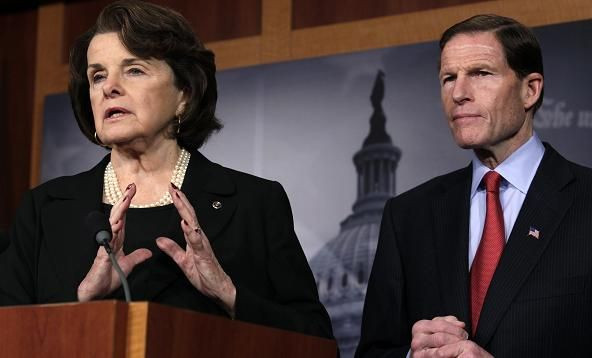NSA FISA Surveillance: Feinstein, Staunch Supporter Of Spying, Backs NSA Reform

The chair of the Senate Intelligence Committee, and a staunch supporter of the government’s surveillance programs, is looking into ways to reform the controversial phone records collection program -- a clear signal that there is momentum in Washington behind reforming the sweeping activities revealed by former NSA contractor Edward Snowden in June.
Speaking during a Senate Judiciary Committee hearing Wednesday, Sen. Dianne Feinstein, D-Calif., said that she is looking into several ways to reform the phone records program as part of the intelligence authorization bill her committee will craft this fall. Feinstein’s counterpart in the House, Rep. Mike Rogers, R-Mich., has also said he will use the authorization bill to make some adjustments to the program.
“I support this program. I think based on what I know, they will come after us and I think you need to prevent an attack wherever we can from happening,” Feinstein said. “That doesn’t mean that we can’t make some changes.”
Among the changes under consideration, Feinstein named more public reporting of statistics on the use of the phone surveillance program. Under the program, the NSA collects metadata -- the numbers, times and duration -- of nearly every domestic call and keeps the information in a database for five years. When the NSA needs to investigate a lead, such as a phone number, an analyst queries the database. Feinstein proposed publicly releasing the number of times the database is queried, the number of times those queries result in a referral to the FBI, and the number of times the FBI then gets a warrant to listen in on phone calls after getting a tip from the NSA. Feinstein also proposed allowing companies to disclose the number of requests for data they get each year under the phone records program.
Feinstein also proposed changing the program itself, including reducing the five-year retention rate of each piece of phone data to two or three years. A second reform would require the NSA to send a report to the Foreign Intelligence Surveillance Court (FISC), which oversees the government’s data requests, as soon as possible so that a judge can “determine the propriety of the query under the law.”
In an op-ed in the Washington Post Wednesday, Feinstein outlined these ideas while also fully defending the value of the phone program, which she said "must be sustained." In the Post, Feinstein also suggested an increased oversight role for Congress by providing classified FISC opinions and orders on domestic surveillance operations be made available to every member of Congress and by increasing the ideological diversity of the FISC, which is currently composed almost entirely of Republican-appointed judges.
As chairman of the committee with oversight of the intelligence community, Feinstein has been aware of the program for years and has defended it since Snowden’s leaks made it public. Feinstein said she wants to preserve the phone program, which she argued plays an important role in counterterrorism efforts. But Feinstein’s decision to introduce her own set of reforms, no matter what her political calculation is, indicates that refusing to make any changes is no longer a tenable position.
When the NSA’s surveillance programs were first revealed, few political observers believed that any substantive changes to the intelligence community would ultimately come about. Politico summarized lawmakers' initial response to the programs as “a collective shrug.” But that seems to have changed after the House of Representatives came within seven votes of approving a measure to halt the metadata collection program.
Talks of reforming the NSA’s programs “certainly have accelerated since that extraordinary House vote,” Sen. Ron Wyden, D-Ore., a vocal opponent of the phone records program, said on C-SPAN’s “Newsmakers” show Sunday.
Though it remains unclear whether any reforms will ultimately pass, members of both parties expressed concern with the programs on Wednesday and some noted that they will introduce more legislation in the coming days to the controversial surveillance issue.
© Copyright IBTimes 2025. All rights reserved.





















